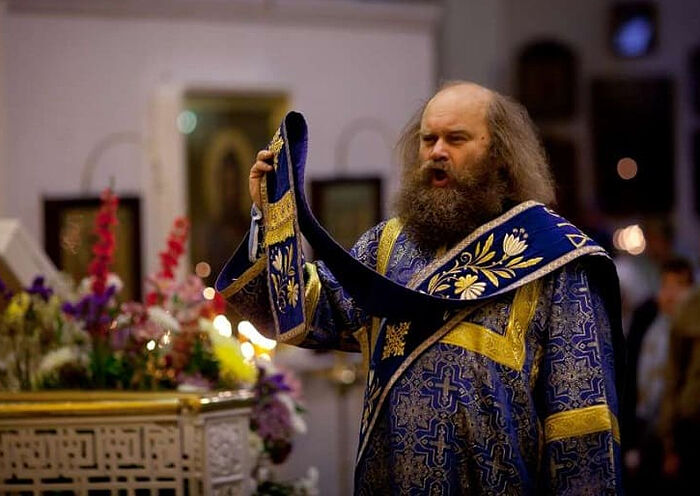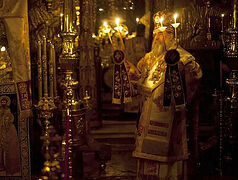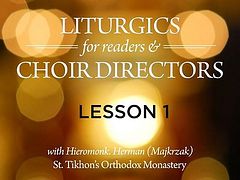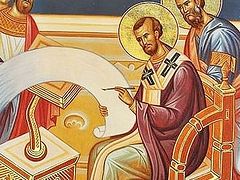Our last talk was dedicated to the words that begin the Divine Liturgy: the blessing, the glorification of the Kingdom of the Father and the Son and the Holy Spirit. The Divine Liturgy takes a man out of the reality of the surrounding world and leads him into another reality, which, however, exists in our life and which man experiences as a state of eternity. Only those who have experienced this personally can fully understand what I’m talking about. The Divine Liturgy is truly the Kingdom of God in time and space, that is in church, in the assembly of the faithful.
The blessing of the Kingdom is followed by a series of petitions, usually pronounced by the deacon, if there is one. If there’s no deacon, then these petitions are read by the priest. The first petition is, “In peace let us pray to the Lord,” which means: “With peace of mind, with peace in our souls, let us entreat the Lord.”
Inasmuch as the entire Liturgy is a chain of petitions and prayers to Christ, at the very beginning, the Church points us to the necessary condition for prayer—spiritual peace. Only he whose soul is filled with peace can entreat the Lord. Some may ask: “Is it really possible for us to always have peace in our souls in this life? If we were in, for example, Libya, Egypt, or Japan, then how, in the midst of military conflicts, earthquakes, and floods could we have spiritual peace, in order to pray to the Lord? Maybe this petition is about something else?” Undoubtedly, the external world is important for man, and the Church also prays for the outside world, which we’ll see in the petition beginning with, “For the peace of the whole world…” It’s important that we have peace in our lives, and in our homes, and in our families. However, this external peace is not always achievable. As you know from your own experience, we very often have to go through various troubles—global, national, social, familial, personal.
I remember St. Paisios the Athonite, who would say in the last years of his life:
“I’m already an old man, but I’ve taken care of my soul to some degree. Therefore, I pray to God not for myself, but for the world, and I tell God about the sufferings that people endure.”
It’s impossible for a Christian to remain indifferent to human suffering; it’s impossible to watch everything happening around us on TV yawning. Unfortunately, so-called virtual reality has taught us to laugh at troubles. We think it’s funny that someone’s killing someone on the screen. But what’s funny about that?
The day the war began in Iraq, I was in England, in London with our Elder Joseph of Vatopedi, and the next morning we were supposed to return to the Holy Mountain. When we heard about the war, we decided to see what they were saying about it on TV that evening. We were staying at some friends’ house. They were showing military operations, combat aircraft, soldiers, and the like on TV. I very clearly remember the children in this family—very good kids. They sat down in front of the screen, soda bottles and sandwiches in hand. They sat in front of the TV, eating and drinking and watching the war just like watching a soccer match. For them as kids it was excusable, but we adults should have a different attitude towards the disasters that the world suffers. A man who is mature both in age and in his spiritual life won’t allow himself to remain aloof from the whole world’s pain and suffering. And I think the more a man succeeds spiritually, the more he shares the sufferings of mankind.
Thus, when the Church commands us to pray with spiritual peace, we naturally have the question: “Where can I find this peace? How can I find it when people are dying nearby, when everything is losing its equilibrium?” Every day you hear: This one got sick, some misfortune happened to that one, a third one died, a fourth has nothing to eat, a fifth has no money to take of his child… What kind of peace can be found in such a world? That peace that Christ brought to earth when He was born, about which the angels sang: “Glory to God in the highest, on earth peace.” Yes, but what were they singing about? After all, as soon as Christ came into the world, enmity immediately rose up against Him: There was the massacre of infants and many other evils. And Christ Himself said: I came not to send peace, but a sword (Mt. 10:34)—that is, war. So what kind of peace are we talking about?
As we’ve already said, it’s very important for us that peace reigns in the environment around us as much as possible. But in the petition we’re examining today, we’re talking about that genuine peace that only God can give a man. Peace is not a psychological state, when everything is going well, and we say, full of optimism: “How wonderful everything is with me!”
The word of God clearly says that Christ is our peace. Christ is peace. If we have Christ in our souls, then we will find peace. If we don’t have Christ, then we don’t have peace, even if external conditions are extremely favorable for us. This is why the Byzantines built churches dedicated to Holy Peace (in Greek Agia Irini)—to Christ. In Istanbul (Constantinople), next to Agia Sophia is a beautiful wooden church that once belonged to the Patriarchate of Constantinople, known as Agia Irini. The faithful think it’s dedicated to the Martyr Irene. But it’s not dedicated to the martyr, but to Christ, Who is the Peace of the whole world, just as the Church of Agia Sophia (Holy Wisdom) is dedicated not to the Martyr Sophia, but to Christ, Who is the Wisdom of the world. God the Father created everything by His Wisdom; He created everything by Christ.
Thus, when the Church calls us to pray “in peace,” it calls us to pray “in Christ,” in communion with Christ, for it is only in Christ that we find genuine spiritual peace. External peace is easily lost when the conditions of our lives, our families, society, the country, or the entire planet change for the worse; our periods of this external peace are broken by various shocks and are not long-lasting or permanent. It’s natural that diseases, sorrows, and various misfortunes deprive us of external peace. Christ said: My peace I give unto you: not as the world giveth, give I unto you (Jn. 14:27). Christ gives peace “not as the world gives,” because the peace of this world depends on external circumstances. If everything around me, in my family, at work is good, if I have enough money and no health problems, then everything is in order for me, and I’m at peace. This is a worldly peace. But any misfortune destroys it. With a change in circumstances, its chimera quickly disappears. How can we pray in true peace, in Christ?
For this, brothers and sisters, it’s very important to reconcile with your conscience, as Christ says. There’s an accuser within us, whom God placed in our soul and who condemns us at every moment. This accuser is called the conscience. The conscience is designed to tell us how we can fulfill the will of God. The more attentively we listen to our conscience, the more sensitive it becomes and the clearer it tells us those things we didn’t understand until yesterday. When we don’t heed its voice and brush it aside, saying: “I don’t care about that,” then the same thing happens as when the tip of a needle is hit with a hammer. The tip becomes blunt from the blows of the hammer and the needle becomes unusable. Thus, the conscience becomes useless when we neglect it. The conscience is a gift of God, left with us after the Fall. Therefore, the Holy Fathers say that man, guided only by the dictates of the conscience, can draw near to God (at least to some degree)—it’s enough just to listen to its voice and have peace with it.
Agree with thine adversary quickly, whilst thou art in the way with him (Mt. 5:25), Christ teaches in the Gospel. Let your conscience speak. You can deceive others, the whole world, but you’ll never deceive your conscience. Never anger it, never dull it. Allow it to talk to you. And be sure to make peace with it, to make friends with it. Do what it tells you in order to find peace in your soul. Whoever avoids listening to the voice of their conscience finds excuses for themselves, contradicts its appeals with various “but, after all…,” and he shouldn’t expect anything good. The time of this life will soon come to an end, and the path along which we must, in the words of Christ, “agree with our adversary,” will soon end.
Who can have an absolutely pure, peaceful conscience if there is no man who doesn’t make mistakes, commit sins, and suffer falls? All of us here, and I am the first among them, make many mistakes, have many sins, and fall every day, and not just once. Only Christ as man absolutely fulfilled the will of God according to His will, and the Mother of God by grace. But the rest of us bear human imperfection. How can we have peace with our consciences? After all, we often make mistakes and commit sins that can’t be corrected. Let’s say I kill a man. How do I fix it? Can I resurrect him? No. How can I calm my conscience and find the peace of God, which is a condition for prayer and standing before God? By repentance. Since there is no way not to sin—no matter what we do, we remain unhappy captives to our passions. What then is our path to salvation, through those saving gates? Sinlessness? No. Infallibility? No. Then what? Repentance. God has given us the chance to learn the great art of repentance. Repentance is the sole path to salvation. Of course, repentance causes the soul pain, especially at the beginning of our conversion to God. It burns us; we feel like we’re in a furnace, and our whole being seems to melt away. (At least that’s how a man who has genuine, fiery repentance feels.) However, after that comes the breath of the Holy Spirit, Who comforts a man who has shed torrents of repentant tears.
The main “instrument” of repentance that purifies the soul from passions and sin is tears, weeping. No matter how strange it may seem, we have to learn the art of tears. We have to learn to cry—and not for show, not just however we want, but we must weep before God. A praying man must learn to weep. Our hardened and calloused heart won’t soften, won’t open up if we don’t weep. Weeping is not just external tears flowing from the eyes. There are people who don’t need much to burst into tears. They can start crying just like that, for no reason. However, there’s nothing wrong with external tears. Let someone have at least external tears. But the weeping I want to talk about is mainly an internal work. St. John Climacus says:
I have seen people who easily shed copious tears. And I have seen people who had weeping in their souls, but their eyes shed no tears. And I honor the second more than the first. I have also seen those who have wept about having no tears.
Thus, weeping and tears are the main “instrument” for leading a spiritual life. Weeping gives birth to peace in our souls. We must learn to weep.
St. Paisios the Athonite said that in his hometown in Cappadocia, the Turks were perplexed when they would walk around the village at night: “What is this? These Romei mourn their dead all night long.” The Turks heard weeping and sobbing and thought that the Greek Christians were crying at night over their dead relatives. They couldn’t understand that people were praying. The Cappadocian Greeks were very simple and sincere people. In accord with Church Tradition, they prayed with tears and truly mourned the dead—their dead souls. We should also weep for our souls this way.
For a man to have peace and the sweet presence of God in his soul, he must have the sweet pain of repentance; he must to learn to open his heart at least once a day that repentant prayer might flow from him, as the Psalm says: I will pour out before Him my supplication (Ps. 141:2). It’s as if you uncork some full vessel, and all contents of your heart, your pain, and your spiritual labor come pouring out.
Christ is our peace and His presence fills our souls with peace. Christ visits the penitent man. Christ doesn’t visit he who doesn’t repent, even if he’s a good man. He comes to hearts that are experiencing suffering and pain (mainly from their repentance) and that seek the mercy of God.
Speaking of repentance—I remember an incident from my life associated with a modern ascetic, Elder Philotheos (Zervakos) from the island of Paros. When I went to visit him, I was eighteen or nineteen, I was a student at the Theological Faculty. To be honest, I didn’t have any particular desire to go see the Elder. I agreed to it only because a really good friend urged me to visit him, and so persistently, that I was almost forced to go. It was uncomfortable to refuse, because this man even bought me a ticket to Paros. There was nowhere I could hide. I went with one other student. We got on the bus in Thessaloniki and rode to Piraeus, where we boarded the ship and sailed to Paros. We met with Elder Philotheos there, who truly was a great saint.
At that time, I was quite determined to immediately go to Mt. Athos right after finishing college. During Confession with the Elder, I told him about my decision to go to the Holy Mountain.
“Go,” he said. “And where will you go there?”
“To Fr. Joseph.”
“The Cypriot? I’ve known him for a long time.”
Elder Philotheos gave me a lot of good instruction, spiritually strengthened me, and read the prayer of absolution. As I was leaving, he added:
“I want to give you something…”
Several of my classmates had gone to see the Elder shortly before this and they asked for something to remember him by, so the Elder gave each of them something. The Elder gave one of my classmates, a deacon, a handkerchief.
“Take this handkerchief, you’ll need it.”
The guys returned with their gifts. The deacon wanted to hear something prophetic from the Elder about his life, about his future, and he just gave him an old handkerchief. He was visibly disappointed. But what would you think this handkerchief meant? Tears! Indeed, the poor man had to face many woes and temptations in his life, and he shed a river of tears.
So when the Elder said he wanted to give me something, I thanked him and thought: “I wonder what it’ll be.” He had trouble getting up (this was in the last years of his life), and he started pulling out drawers, looking for something fitting for me. I remembered my classmate the deacon and said:
“Geronda, you don’t have to look around. You can give me anything—a handkerchief, for example.”
“No! I’m not going to give you a handkerchief.”
“Well, then some kind of photo…”
“Photography is a good thing, but I’m going to give you a Panagia.”
I was a little shocked that he wanted to give me something only bishops wear. But I didn’t think much about it at the time.[1]
The Elder kept looking and finally pulled a Panagia out of a drawer—a simple plastic icon he got one time in memory of the consecration of the Church of St. Nikon Metanoeite.[2]
“I want to give you this. Take it and preach repentance.”
“Geronda, where am I going to preach repentance,” I asked, surprised again. “On the Holy Mountain?”
Again, I didn’t think a lot about why he specifically gave me a Panagia.
“After thirty…” he said.
“Apparently, I’ll become a priest after I’m thirty, according to the canons. That’s why the Elder said this,” I decided.
I came to Cyprus from Mt. Athos at the age of thirty-four, and I’ve been talking ever since. I’ve only now realized the meaning of Elder Philotheos’ words. Over time, I recall his words more and more, and I see that the entire Gospel and the entire spiritual life has repentance as its foundation. Therefore, when Christ came to earth, He taught us to repent; He taught this great Mystery. Repentance isn’t simply regret for what we’ve done. It implies true repentance, contrition, and sorrow for the mistakes made and the sins committed.
Weeping and grieving over your departure from God, you gradually find peace, rest of soul, and you calm down. What happens at this time? Your mind, your being acquires a different perception of reality. Yesterday, money or health was important for you, but today these things no longer interest you; they stop being the goal of your life. Your way of thinking changes. This is the essence of repentance. If you don’t change your way of thinking and remain the same, it means you’re just doing good deeds outwardly. Sometimes we do a little good just to stifle the voice of our conscience within ourselves. For example, I have many opportunities to help people or devote my time to prayer, but I do hardly anything, just enough so I have the right to declare: “I did something too.” We don’t want to go all the way and don’t allow Christ to change our being. That’s why when some people wanted to follow Him while He was preaching, wanting to show that meeting Him means a radical change in our whole existence, our whole being, Christ would say things that would make them freeze in bewilderment.
“Lord, what can I do to follow Thee?”
“Do you want to follow Me? Good. Go sell your possessions and follow Me.”
The man simply froze. “Go and sell everything?!...” Just as surgeons make an incision to see what’s inside the body, so the Lord, by His word, cut into this man, so to speak, to show that His presence in our life and our relationship with Him consists not in performing some kind of external good works, but in the complete change of our entire being. This is the only way peace comes to the soul of man—by cultivating repentance in our souls.
Repentance begins with regret, when we begin to condemn ourselves. Then we move on to weeping over ourselves. We behold the abyss that separates us from God—where God is and where I am. What a wealth of gifts and opportunities God has given me, and how I have squandered all the riches I received from Him in the debauchery of my life. And so we begin to cultivate tears, to weep, and with their help—find repentance. Let us learn to cry, so as to acquire spiritual balance. Weeping—especially in solitude before God—is a whole art. If we learn it, then we will begin to succeed spiritually. Weeping attracts Christ to our hearts. Christ comes to our humble, penitent hearts, and a great change begins. We become different, and then we can truly pray to the Lord in peace.
With this begins the Divine Liturgy. This is the condition for our dialogue with God in prayer. If we have no peace, we can communicate neither with God nor man.




